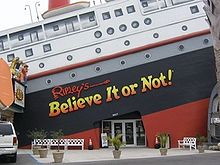Curiosity
A curiosity ( plural curiosity , also curiosity , from the Latin curiosity ' curiosity ') refers to people, animals, objects, situations or states that appear or act strange, whimsical, funny or bizarre in every conceivable way. The essence of a curiosity is usually the amazement of the recipient , which arises from unusual or surprising deviations from usual behavior patterns or ways of thinking. A curiosity amuses, arouses or satisfies curiosity. Objects, people and animals that deviate in their figuration in a strange or astonishing way from the usual norms are also called curiosities.
history

Curiosities have been brought together and put on public display in collections since ancient times. These cabinets of rarities or curiosities were forerunners of the so-called Chambers of Wonder in the Renaissance and Baroque periods , from which museums later emerged. Often these were people and animals that were physically disfigured and showed monstrous features ( freak show ). Until about the middle of the 20th century, in addition to stationary, mobile curiosity cabinets of this type were operated, which visited fairs and other folk festivals . In the meantime, these naturalistic collections of curiosities have largely disappeared in the western world. Some believe that an ethical approach has prevailed here that forbids the display of human and animal abnormalities .
Other publicly accessible collections still exist. For example, the American comic artist and radio reporter Robert Ripley collected all kinds of curiosities on his numerous trips around the world. In 1933, he created a new museum in his hometown of Chicago , Ripley's Odditorium (from odd ; strange, strange, strange). Today there are over 20 such odditories worldwide, most of them in the USA .
literature
- Andrea Hübener et al. (Ed.): Curiosity as knowledge. Futura-Ed., Flensburg 2002, ISBN 3-924834-25-3 . (German English)
- Christian Mürner : Media and cultural history of disabled people. Lust for sensation and self-determination. Beltz, Berlin 2003, ISBN 3-407-57200-X .
- Stéphane Jacob: La curiosité - éthologie et psychologie. (= Psychologie et sciences humaines. 245). Mardaga, Sprimont 2002, ISBN 2-87009-815-4 .
- Kathrin Passig, Aleks Scholz: Lexicon of ignorance - to which there is no answer so far. 6th edition. Rowohlt, Berlin 2007, ISBN 978-3-87134-569-2 .
- André Blavier: Les fous littéraires. (= Le rappel au désordre). Veyrier, Paris 1982, ISBN 2-85199-268-6 .
- Jürgen Brater: Curious world in numbers. Eichborn, Frankfurt am Main 2005, ISBN 3-8218-4888-X .
- Alexander von Schönburg: Lexicon of superfluous things. Rowohlt, Berlin 2006.
- Harald Krause: Lexicon of religious curiosities. Kreuz-Verlag, Stuttgart 2006, ISBN 3-7831-2822-6 .
- RJW Evans (Ed.): Curiosity and Wonder from the Renaissance to the Enlightenment. Ashgate, Aldershot 2006, ISBN 0-7546-4102-3 .
- Ludovic Lalanne: Curiosités historiques. (= Bibliothèque de poche). Delahays, Paris 1857.
- Anne and Ingo Reichardt (eds.): Dog bites airplane - a thousand strange reports from all over the world. Stamm, Essen 2001, ISBN 3-87773-032-9 .
Remarks
- ↑ Others only see a shift in the sensational reporting of the mass media : People also crave to see pictures of disasters, and that is what television offers them. ... the audience wants to see something. In principle, if you will, they want to see bleeding corpses or shot-up houses or devastated landscapes or erupting volcanoes. And the more happens in the picture, the more interesting it is for the viewer. Lothar Mikos , archived copy ( Memento of the original from March 28, 2005 in the Internet Archive ) Info: The archive link was inserted automatically and has not yet been checked. Please check the original and archive link according to the instructions and then remove this notice.